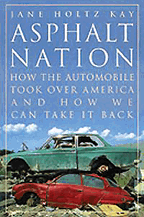The Seventh Generation
by Thomas Angotti
On Saturday, July 12th of this year, I was performing my daily jogging ritual in Prospect Park, Brooklyn’s great green space, when I came across a biker laid out on the park roadway. She had been hit by a van using the roadway as a shortcut. The van had been doing 40 mph, separated from a stream of joggers and bikers by a thin white line on the pavement. This particular section of the park roadway is open to vehicles at all times, though most of the park is closed to traffic on weekends. For years Transportation Alternatives and other advocacy groups have been after the City to keep cars out of the park. After all, whose idea was it to let these 3,000 pound weapons with wheels get so close to walkers and baby carriages in the first place?
The biker later died. She was Dr. Rachel Fruchter, a physician and activist who supported many progressive causes. She was a panelist the PN 96 Conference in Brooklyn.
Rachel Fruchter became one of the 250 or so bikers and pedestrians killed by automobiles each year in New York City. The driver of the van got off with a ticket for a cracked windshield. The cops and the Parks Commissioner said it wasn’t their fault, either.
In a world where cars are worth more than people, the insurance companies pay and close the case. No one’s responsible. Assaults by people in autos are considered “accidents.” It’s not the fault of the driver, or of the traffic engineers and planners or elected officials who would move traffic at all costs.
Too many planners and local governments in the United States are as car crazy as the American Automobile Association. They foster auto-dependent development by requiring excess roadways and parking and ignoring mass transit, pedestrian and cycling options. They usually overlook simple devices to prevent “accidents” — such traffic calming techniques as neck-downs and speed bumps.
Not to thrash the planners too much. Local planners have to deal with a national government that’s been so drugged by oil and auto monopolies that it giddily fuels the gas habit with copious road subsidies. All the more reason for planners to join the transportation advocacy and environmental groups pressing for a shift in national priorities.
Some say that drivers should be forced to pay the real social cost of driving (including losses due to “accidents,” air pollution, runoff, and the huge public expenditures for road maintenance). William Vickery, the Nobel prize winner who died this year (and who was an occasional visitor to the PN New York Forums), developed the idea of “congestion pricing” — using higher prices to make auto users pay for the mess they cause. I don’t think, though, that making auto users pay their fair share is good enough. As in the rest of the world that is not yet auto-crazed, the rich will drive and the rest of us will have to hoof it in cities made for cars. Equity and really sustainable transportation planning have to be part of the same package.
PN Tax-Deductible
Planners Network is now a non-profit corporation registered in the State of New York. This means that your contributions to PN will be fully tax-deductible. If you haven’t made a contribution in the last year, please send a tax-free check now. Members are the sole source of revenues for PN.
While becoming a non-profit corporation, the Steering Committee developed, for the first time, by-laws to govern the organization. In the next issue, we’ll publish the by-laws (this issue is too full!) and ask for your comments.
